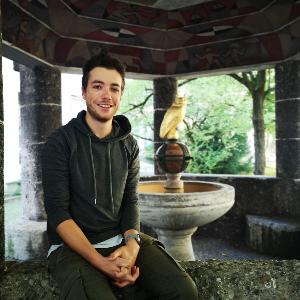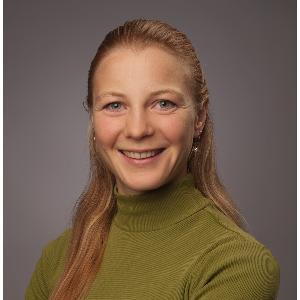Let’s talk about research!
10 Oct 2022
How do budding researchers spread the word about their topics? And what motivates them? We talked to young researchers at LMU.
10 Oct 2022
How do budding researchers spread the word about their topics? And what motivates them? We talked to young researchers at LMU.

Bastian Jürgen Wagner is trying his hand as a science slammer. | © LMU
Who has heard of Étienne Dolet? The name of the French humanities scholar is likely to become better-known even outside of academic audiences in the near future, if LMU doctoral candidate Bastian Jürgen Wagner has any say in the matter. The philologist is currently preparing a science slam about Dolet – demonstrating that there is evidently no academic subject that cannot be made accessible to a broader public.
LMU geographer Dr. Magdalena Mittermeier operates in a completely different space, conducting research into climate change and its consequences: “So much is published about climate change, it can’t just be the exclusive preserve of the academic community. If I concern myself day in, day out with such an important and socially relevant topic, I simply have to talk about it as well.”
I believe a distinguishing feature of young researchers is that communicating the science is in our thoughts from an early stage.Magdalena Mittermeier
In the context of her current research, she also makes proactive use of social media such as Twitter and LinkedIn. That said, the question of how best to communicate new findings does not crop up only at the end of a given study: Even while the paper is still a work-in-progress, at the back of her mind she is already thinking about how to design visuals that the media will be able to pick up and run with. Asked about the style of communication common among young researchers, Mittermeier has this to say: “I believe a distinguishing feature of young researchers is that communicating the science is in our thoughts from an early stage.”

LMU geographer Dr. Magdalena Mittermeier makes proactive use of social media In the context of her current research.
Her expertise is especially in demand when new publications are coming up – in specialist media, but also in newspapers and online media with a wider audience. Best of all, however, she enjoys direct, face-to-face dialogue. “During my doctoral studies, I was called on to speak and hold workshops on climate change issues. That was my path to scientific communication.” A founder member of the climate change mitigation group “Climate Delegation”, Mittermeier had already been committed to sharing knowledge on a voluntary basis. And she is still eager to do more than merely talk about her own scientific findings: “I like to have an overview of the whole discipline, and to be able to link it to the communication of my own research,” she explains, “because as a scientist, I myself can only ever work on one small part of the wider puzzle.”
In the lectures she delivers, Magdalena Mittermeier also experiences how “emotionally charged” the topic of climate change is, which makes her even more keen to help keep the debate objective. “I am essentially an optimist, too. And, without losing sight of the dimensions of climate change, my audience too should be able to go home in a positive mood. I don’t want them to just be frustrated.” Accordingly, she always strives to inject a positive perspective into her talks and workshops: “I am often asked what the individual can do. And while I believe political responsibility for mitigating climate change cannot be delegated to the individual, I still think it is important to show how each one of us make an impact in our actions and in our immediate environment – as private individuals, but above all also as professional and politically active citizens.”
Communication, she stresses, is a constant learning process. “I wouldn’t say I have yet found the perfect balance” – although most of the feedback she receives is positive. “On the whole, I am not very active on social media,” she says. “I attach greater importance to direct communication, which is much easier.” From time to time, she still runs into statements that are false or not evidence-based. “When that happens, I try to present reasoned and objective explanations. Above all I find that, in this kind of situation, it is important not to leave false statements unchallenged.” While her efforts do not always succeed, she only ever encounters isolated individuals who are no longer accessible to objective argumentation.
Coming from a completely different angle, Bastian Jürgen Wagner is conducting doctoral research in an area known to comparatively few people. The LMU philologist’s dissertation project tackles humanities scholar Étienne Dolet’s work Dialogus, De Imitatione Ciceroniana. Invariably, Wagner first has to explain why this work, penned in 1535, maintains its fascination in several respects to this day. And to do so, he has to give something of the bigger picture: “It is a Latin text, written in the form of a dialogue by a Frenchman who was arguing against Latin as a kind of European lingua franca – and who, shortly after its publication, began to only write in French,” the doctoral candidate says. “The text is vehemently opposed to Erasmus of Rotterdam, who favored Latin as a common language. And in so doing, it effectively closes the door on Latin.” Dolet clearly rejects Erasmus’ forceful “European idea”, Wagner says, in favor of the increasingly clear delineation of individual nations.
Although a science slam is primarily supposed to be entertaining, I think people still learn a little – even if it is only that this area of research exists.Bastian Jürgen Wagner
Shortly afterward, French became the official language – another identity-forming factor for the youthful nation of France. “This concept of national differentiation is today very strongly resurgent in some countries.” Seeking a new and entertaining way to explain nationalistic discourse in the early modern humanities and bring what, at least at first glance, is a historical subject back into the limelight, Wagner is currently trying his hand as a science slammer. “I have previously taken part in poetry slams in the university milieu, but that has never involved talking about my research.” He hopes that this will now change when he takes the stage for the first time at the Doctoral Researchers’ Convention at LMU’s GraduateCenter. “Although a science slam is primarily supposed to be entertaining, I think people still learn a little – even if it is only that this area of research exists.”
At the science slam, Wagner wants to shed light not only on his own dissertation project, but also on the fact that Latin did not die out as a language with ancient writers such as Cicero. “Latin was still alive as a spoken language only 500 years ago, and there was talk of making it Europe’s common language.” If more early modern texts such as that of Étienne Dolet were featured in the curriculum, the philologist believes more students’ enthusiasm for the topic could be rekindled.
This, he argues, is primarily because his research subject certainly contains entertaining elements: “I believe that having my two humanist scholars badmouthing each other can come across quite simply as funny, even though the literary quality of their very narrowly defined debate is extremely high.” For all his verbal aggression – calling Erasmus a “doddery old man” and a “drunken monk”, for example – Dolet did also have some compelling arguments. One of these was that far too few people had a sure command of Latin at the time, making it an absurd choice as the common European language.
Wagner is looking forward to his appearance at the science slam: “I don’t think the audience attends this kind of event to learn lots of new scientific details.” Having said that, such an entertaining format can indeed open a door to academic research.
Doctoral Researchers’ Convention at LMU’s GraduateCenter: Details of the program (in German) and of the Science Slam